牛津6A知识点复习
牛津6A基础知识汇总

牛津6A基础知识汇总Unit 1单词1:always总是 2:question问题 3:ask问请求要求 4:mean意思是意指 5:must必须应当 6:should应当应该7:shouldn’t=should not不应该 8:pick拾采9:public公共的公众 10:sign标志告示牌子 11:cousin堂(表)兄弟姐妹 12:danger 危险 13:away(离)开 14:grass草地草 15:bird鸟 16:cage笼子 17:quiet安静的 18:noise噪声喧闹声 19:smoke吸烟20:litter乱丢杂物 21:park停放(汽车)22:touch触摸 23:suddenly突然(地) 24:something某事某物 25:note钞票纸币26:around周围在附近 27:nearby附近的 28:quickly快地29:keeper看守人 30:point 指 31:fine罚款短语1. four years old 四岁2. ask Ben some questions 问Ben 一些问题3. go in 进去4. stay away 远离5. keep off 远离6. make noise 发出(喧闹)的声音7. talk about 讨论 8. public signs 公共标志9. No smoking 禁止吸烟 10. No littering 禁止乱扔杂物11. No parking 禁止停车 12. Do not touch 禁止触摸13. Danger! 危险 14. No eating or drinking 禁止吃喝东西15. Keep off the grass 远离草地 16. take a walk 散步17. Be quiet 保持安静 18. be back home from the zoo 从动物园回家19. a ten-yuan note 一张十元纸币 20. say to 对……说21. pick up 拾起 22. come up 上来23. point to 指向 24.look around环顾四周25. fine ¥10 罚款10元 26. birds’cage鸟笼27.walk on the grass 在草地上行走 28.ask sb about sth 问某人关于某事29.no one nearby 附近没有人 30.give me ten yuan=give ten yuan to me 给我十元 31.shake one’s head 摇头句型1:He is asking Ben some questions. 他正在问本一些问题。
牛津6A知识点复习
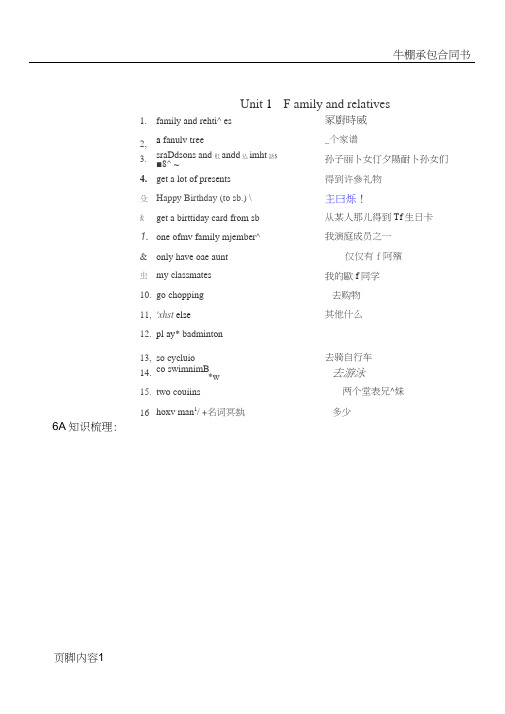
牛棚承包合同书页脚内容1Unit 1 F amily and relatives1. family and rehti^ es 冢廚時威2, a fanulv tree _个家谱3.sraDdsons and 肛andd込imht話$■8^ ~孙子丽卜女仃夕陽耐卜孙女们4.get a lot of presents 得到许參礼物殳Happy Birthday (to sb.) \主曰烁!&get a birttiday card from sb 从某人那儿得到Tf生日卡1.one ofmv family mjember^ 我演庭成员之一&only have oae aunt 仅仅有f阿殯虫my classmates 我的歐f同学10.go chopping 去购物11,'xhst else其他什么12.pl ay* badminton13,so cycluio 去骑自行车14. co swimnimB *w 去游泳15.two couiins 两个堂表兄^妹16hoxv man1/ +名词冥埶多少6A知识梳理:牛棚承包合同书语言点1. This is my grandfather.®是我的(外)祖父。
These are my lam ily and relatives.这些是我的家人和亲戚■>注意句中各成分保持单复数同形,2. T m their son.,我是他们的儿子&We:T re their sons.们杲他们的儿子*3. How many uncles do you hzx?你有多少个叔叔?How rn^y后面接可数名词的复数形式o4. What do you do with your...?你和你的”干什么?5. What else- do 丫口u do with your»?你和你的”还干什么?6. What else do you do with your»?你^你的”还干什么?With是个介词.后面接人称代词时!要用宾格的形式。
牛津英语6A期末复习知识点
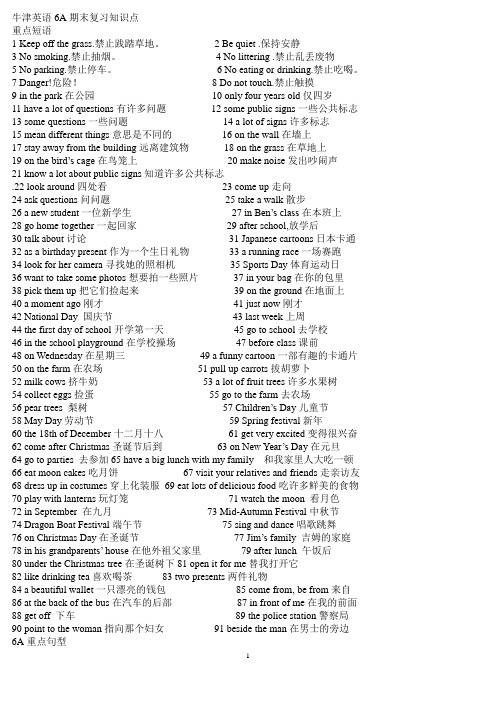
牛津英语6A期末复习知识点重点短语1 Keep off the grass.禁止践踏草地。
2 Be quiet .保持安静3 No smoking.禁止抽烟。
4 No littering .禁止乱丢废物5 No parking.禁止停车。
6 No eating or drinking.禁止吃喝。
7 Danger!危险!8 Do not touch.禁止触摸9 in the park在公园10 only four years old仅四岁11 have a lot of questions有许多问题12 some public signs一些公共标志13 some questions一些问题14 a lot of signs许多标志15 mean different things意思是不同的16 on the wall在墙上17 stay away from the building远离建筑物18 on the grass在草地上19 on the bird’s cage在鸟笼上20 make noise发出吵闹声21 know a lot about public signs知道许多公共标志.22 look around四处看23 come up走向24 ask questions问问题25 take a walk散步26 a new student一位新学生27 in Ben’s class在本班上28 go home together一起回家29 after school,放学后30 talk about讨论31 Japanese cartoons日本卡通32 as a birthday present作为一个生日礼物33 a running race一场赛跑34 look for her camera寻找她的照相机35 Sports Day体育运动日36 want to take some photos想要拍一些照片37 in your bag在你的包里38 pick them up把它们捡起来39 on the ground在地面上40 a moment ago刚才41 just now刚才42 National Day 国庆节43 last week上周44 the first day of school开学第一天45 go to school去学校46 in the school playground在学校操场47 before class课前48 on Wednesday在星期三49 a funny cartoon一部有趣的卡通片50 on the farm在农场51 pull up carrots拔胡萝卜52 milk cows挤牛奶53 a lot of fruit trees许多水果树54 collect eggs捡蛋55 go to the farm去农场56 pear trees 梨树57 Children’s Day儿童节58 May Day劳动节59 Spring festival新年60 the 18th of December十二月十八61 get very excited变得很兴奋62 come after Christmas圣诞节后到63 on New Year’s Day在元旦64 go to parties 去参加65 have a big lunch with my family 和我家里人大吃一顿66 eat moon cakes吃月饼67 visit your relatives and friends走亲访友68 dress up in costumes穿上化装服69 eat lots of delicious food吃许多鲜美的食物70 play with lanterns玩灯笼71 watch the moon 看月色72 in September 在九月73 Mid-Autumn Festival中秋节74 Dragon Boat Festival端午节75 sing and dance唱歌跳舞76 on Christmas Day在圣诞节77 Jim’s family 吉姆的家庭78 in his grandparents’ house在他外祖父家里79 after lunch 午饭后80 under the Christmas tree在圣诞树下81 open it for me替我打开它82 like drinking tea喜欢喝茶83 two presents两件礼物84 a beautiful wallet一只漂亮的钱包85 come from, be from来自86 at the back of the bus在汽车的后部87 in front of me在我的前面88 get off 下车89 the police station警察局90 point to the woman指向那个妇女91 beside the man在男士的旁边6A重点句型1、There are a lot of signs here. 这儿有许多标志。
牛津版小学英语6A知识点归纳总复习
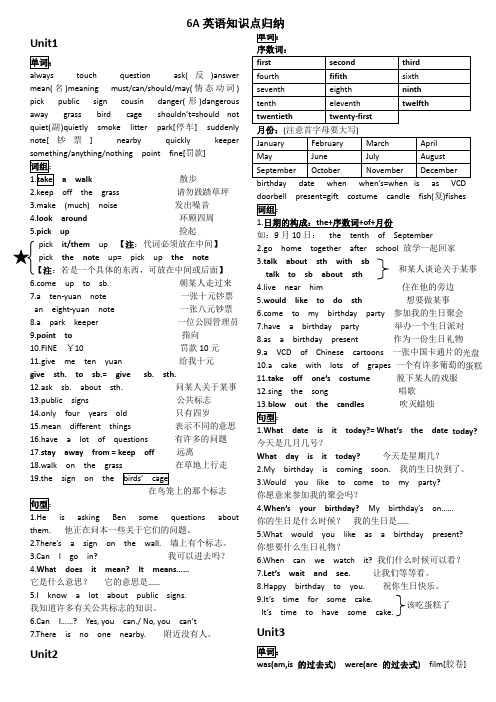
Unit1always touch question ask(反)answer mean(名)meaning must/can/should/may(情态动词) pick public sign cousin danger(形)dangerous away grass bird cage shouldn ’t=should not quiet(副)quietly smoke litter park[停车] suddenly note[钞票] nearby quickly keeper point fine[罚款]a walk 散步2.keep off the grass 请勿践踏草坪3.make (much) noise 发出噪音4.look around 环顾四周5.pick up 捡起pick it/them up 【注:代词必须放在中间】 pick the note up= pick up the note 注:若是一个具体的东西,可放在中间或后面】 e up to sb. 朝某人走过来 7.a ten-yuan note 一张十元钞票 an eight-yuan note 一张八元钞票 8.a park keeper 一位公园管理员 9.point to 指向10.FINE ¥10 罚款10元 11.give me ten yuan 给我十元 give sth. to sb.= give sb. sth.12.ask sb. about sth. 问某人关于某事 13.public signs 公共标志 14.only four years old 只有四岁15.mean different things 表示不同的意思 16.have a lot of questions 有许多的问题 17.stay away from = keep off 远离18.walk on the 在草地上行走 19.the sign on the在鸟笼上的那个标志1.He is asking Ben some questions about them. 他正在问本一些关于它们的问题。
牛津小学英语6A知识梳理

牛津小学英语6A知识梳理词汇和句型Unit 11. No smoking 禁止吸烟2. No littering禁止扔杂物3. No parking禁止停车4. No cycling禁止骑自行车5. No eating and drinking 禁止吃喝6.keep off the grass不接近草坪7.Be quiet保持安静8. Do not touch不要摸9. a lot of \ a lot大量的;许多10. public signs公共标志11. on the wall在墙上12. stay away from…远离……13.walk on the grass在草地上走14. the bird’s cage鸟笼15. make noise发出噪音16. take a walk散步17. a ten-yuan note 一张十元的钞票18. look around四周看19. pick up捡起20. come up to sb. 走近某人What does it/this/that mean? It means you/we must/should/shouldn’t…There are a lot of signs here. They mean different things.Unit 21. a new student in Ben’s class本班上的一位新学生2. go home together一起回家3. after school放学以后4. talk about谈论有关……5. come soon 快到了6. the third of March 三月三日7. on the twenty-second of July在七月二十二日8. on the 18th of October 在十月十八日9. your birthday你的生日10. Let’s wait and see让我们等一下看看11. blow out the candles吹灭蜡烛12. as a birthday present作为生日礼物13. birthday cake生日蛋糕14. come to my birthday party来参加我的生日聚会15. have a birthday party举办生日聚会16. a VCD of Japanese cartoons一张日本卡通光盘17. open the door 开门18. make a birthday card 做一张生日贺卡19. take off脱下20. blow out 吹灭21. a piece of paper一张纸22. fold it in half把它对折in the bayWhen’s your birthday? My birthday’s on …What would you like as a birthday present? I’d like …What date is it today? It’s the 16th of October. My birthday is coming soon.Would you like to come to my birthday party?Would you like a VCD of Japanese cartoon, too?Let’s wait and see.Unit 32. all the students所有的学生3. be excited非常激动4. very exciting非常令人兴奋5. look for寻找6. a running race一场赛跑7. let me see让我看看8. a moment ago / just now刚才9. on the ground在地上10. pick them up for me帮我把它们捡起来11. in front of 在……前面12. next to 紧靠……旁边13. a pair of glasses一副眼镜(单数)14. a roll of film一卷胶卷(单数)15. a diary\ three diaries 一本日记、三本日记16. a pair of earphones一副耳机(单数)17. listen to music 听音乐18. yesterday evening 昨天晚上19. under the table在桌子下面20. try to remember试图记住21. in the red box在红色盒子里22. close your eyes 闭上你的眼睛23. play a game 玩游戏24. with your classmates 和你的同学们25. over there 在那边26. in my school bag 在我的书包里It is Sports Day. Let me see.Can I have them, please? Can you pick them up for me, please? It isn’t there now. It was there a moment ago.Where are my /your …? They’re next to/in front of/on/in/between the …They aren’t there now. They were there a moment ago.Unit 51. National Day(国庆日)2. the National Day holiday(国庆假期)3. last week/ last year上个星期/去年4. after the holiday(假期后)5. go to school early(很早上学)/ early -- late6. in the school playground(在学校操场上)7. before class(上课前)/ before -- after8. watch a film with my parents(和我的父母一起去看电影)/ watched9. a funny cartoon(一部有趣的卡通片)/ funny(形容词)10. visit a farm with my family(和我的家人一起参观农场)/ visited11. on the farm(在农场里)12. water trees(浇树)/ watered13. pull up carrots(拔胡萝卜)/ pulled up14. milk cows(挤牛奶)/ milked15. That was fun!(那是件有趣的事!)/ fun(名词)16. collect eggs(收集鸡蛋)/ collected17. fruit trees(果树)18. pick a lot of oranges(摘许多橘子)/ picked19. taste them(品尝它们)/ tasted20. Wonderful!(太好了!)21. go to the farm(去农场)/ went22. at the weekends(在周末)23. watch cartoons(看动画片)/ watched24. visit the zoo(参观动物园)/ visited25. listen to music(听音乐)/ listened26. play football(踢足球)/ played27. play volleyball(打排球)/ played28. clean the house(打扫房子)/ cleaned29. visit Liu Tao’s grandparents(拜访刘涛的祖父母)/ visited30. camping trip(野营旅行)31. at a camp(在一个营地上)32. walk in the mountains(登山)/ walked33. cook a lot of food(做许多食物)/ cooked34. play a lot of games(玩许多游戏)/ played35. go camping(去野营)/ went36. plant flowers(种花)/ planted37. have a good time(玩得很高兴)/ hadUnit 61.get very excited 变得非常兴奋e after 在……之后到来3.New Year's Day 元旦4.on New Year's Day 在元旦5.at Christmas 在圣诞节6.go to parties 去参加聚会7.have a big lunch 吃一顿丰盛的午餐8.at Spring Festival 在春节9.What do people usually do at Spring Festival?人们通常在春节干什么?10.visit their relatives and friends 拜访他们的亲戚和朋友11.eat lots of delicious food吃许多美味的食物st Spring Festival 上个春节13.of course 当然14.my favourite holiday 我最喜爱的节日15.in October 在十月16.dress up in costumes 用戏服装扮st Halloween 去年万圣节18.Mid-Autumn Festival 中秋节19.eat moon cakes 吃月饼20.play with lanterns 玩灯笼21.watch the moo赏月n22.the beautiful moon 漂亮的月亮23.on different holidays 在不同的节日st year 去年25.at Easter 在复活节26.from…to从……到………27.listen to him 听他讲28.in the grass 在草丛中29.a popular holiday一个流行的节日30.in China 在中国31.in January or February 在一月或二月32.eat rice dumplings 吃粽子33.like to play with lanterns喜欢玩灯笼34.watch the dragon boat races 观看龙舟比赛Christmas is coming.My favourite holiday is Halloween. What’s your favourite holiday?When’s …? It’s in …What do people usually do at …? They …Did you … last …? Yes, I did. / No, I didn’t.Unit 71.on the 25th of Dece在12月25日mbe2.Christmas Day 圣诞日3.on Christmas Day 在圣诞日4.im's family 吉姆一家人J5.in his grandparent's house在他爷爷奶奶的房子里6.Christmas trees 圣诞树7.the presents under the Christmas tree在圣诞树下的礼物8.so many 这么多9.from grandmother 来自祖母10.open it for me 为我打开它11.like drinking tea 喜欢喝茶12.be from 来自13.Christmas presents 圣诞礼物14.at Jim's house 在吉姆家15.draw and write in the diary 在日记上画和写16.go to the supermarket 去超市17.sit at the back of the bus 坐在公共汽车的后面18.get off 下车19.the seat in front of me 在我前面的座位20.the woman beside him 在他旁边的妇女21.walk to the driver 走向驾驶员22.after lunch 午餐后23.You are welcome. 不用谢24.next to the blackboard 紧靠黑板25.get many presents on Christmas Day 在圣诞节得到很多礼物26.at the back 在……后部27.write his diary 写他的日记28.under the seat 在座位下面29.open the presents 打开礼物Whose …is it/ are they? It’s / They’re mine/yours/his/hers/ours.This one is from Grandpa. Open it for me, please.Who are they from? They’re from Grandpa and Grandma.语法分析1、序数词序数词的构成是在以之相对应的基数词词尾加th,个别例外:◆one – first two—second three—thirdfive—fifth eight—eighth nine—ninthtwelve – twelfth◆以ty结尾的,先变y为i,加thforty—fortieth◆缩写形式1st 2nd 3rd 4th 5th 22nd 31st2、一般过去时一般过去时表示过去某个时间发生的动作或存在的状态,常和表示过去的时间状语连用。
译林牛津英语6A学习知识重点汇总
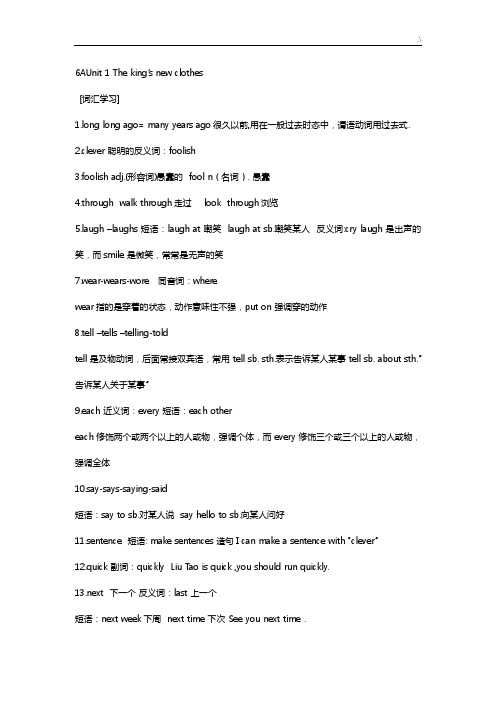
6AUnit 1 The king’s new clothes[词汇学习]1.long long ago= many years ago很久以前,用在一般过去时态中,谓语动词用过去式.2.clever 聪明的反义词:foolish3.foolish adj.(形容词)愚蠢的 fool n(名词). 愚蠢4.through walk through走过 look through浏览ugh –laughs 短语:laugh at 嘲笑 laugh at sb.嘲笑某人反义词:cry laugh 是出声的笑,而smile 是微笑,常常是无声的笑7.wear-wears-wore 同音词:wherewear指的是穿着的状态,动作意味性不强,put on 强调穿的动作8.tell –tells –telling-toldtell是及物动词,后面常接双宾语,常用tell sb. sth.表示告诉某人某事 tell sb. about sth.”告诉某人关于某事”9.each 近义词:every 短语:each othereach修饰两个或两个以上的人或物,强调个体,而every修饰三个或三个以上的人或物,强调全体10.say-says-saying-said短语:say to sb.对某人说 say hello to sb.向某人问好11.sentence 短语: make sentences 造句I can make a sentence with “clever”12.quick 副词:quickly Liu Tao is quick ,you should run quickly.13.next 下一个反义词:last 上一个短语:next week下周 next time 下次 See you next time .14.little 小的,年幼的反义词:big 近义词:small15.think –thinks –thinking-thought 短语:think of想起 think hard 认真思考16.child复数:children 短语:Children’s Day儿童节 the only child 唯一的孩子17. turn to 变成 Water turned into ice at last.短语归纳Story timelong long ago 很久以前 new clothes 新衣服 one day 一天make…..for……为…….制作…… try on试穿 clever people聪明的人foolish people愚蠢的人 walk through走过 a lot of people 许多人in the street 在街道上 beautiful clothes漂亮的衣服 a little boy 一个小男孩 point at指着…….. Cartoon timeplay a game 玩游戏 tell a story 讲故事 each student 每个学生on the mountain 在山上 the next sentence 下一句 an old man 一位老人live in 居住在 think hard 认真思考 have to 不得不Grammar time一般过去式的用法1. 一般过去式的概念:表示在过去某个时间发生的动作或状态,常与表示过去的时间状语连用。
牛津6A知识点复习
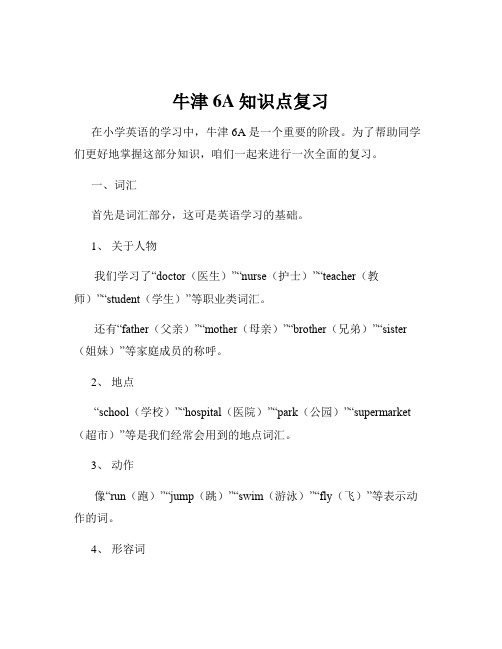
牛津6A知识点复习在小学英语的学习中,牛津 6A 是一个重要的阶段。
为了帮助同学们更好地掌握这部分知识,咱们一起来进行一次全面的复习。
一、词汇首先是词汇部分,这可是英语学习的基础。
1、关于人物我们学习了“doctor(医生)”“nurse(护士)”“teacher(教师)”“student(学生)”等职业类词汇。
还有“father(父亲)”“mother(母亲)”“brother(兄弟)”“sister (姐妹)”等家庭成员的称呼。
2、地点“school(学校)”“hospital(医院)”“park(公园)”“supermarket (超市)”等是我们经常会用到的地点词汇。
3、动作像“run(跑)”“jump(跳)”“swim(游泳)”“fly(飞)”等表示动作的词。
4、形容词“big(大的)”“small(小的)”“tall(高的)”“short(矮的)”“fat (胖的)”“thin(瘦的)”等形容词可以用来描述事物的特征。
要记住这些词汇,不能死记硬背,可以通过图片、句子或者实际场景来帮助记忆。
二、语法语法是英语学习中的重点和难点。
1、一般现在时这是我们经常会用到的时态,表示经常发生的动作或存在的状态。
比如:“I go to school every day(我每天去上学。
)” 主语是第三人称单数时,动词要发生变化,像“He likes playing football(他喜欢踢足球。
)”中的“like”就要变成“likes”。
2、现在进行时表示正在进行的动作,结构是“be +动词的现在分词”。
例如:“I am reading a book now(我现在正在读书。
)”3、一般过去时用来描述过去发生的事情,动词要用过去式。
像“I went to Beijing last year(我去年去了北京。
)”4、名词的单复数一般情况下,直接在名词后面加“s”,比如“book books”。
但有些名词的复数形式是不规则的,比如“man men”“woman women”“child children”。
牛津小学英语6A 复习要点1
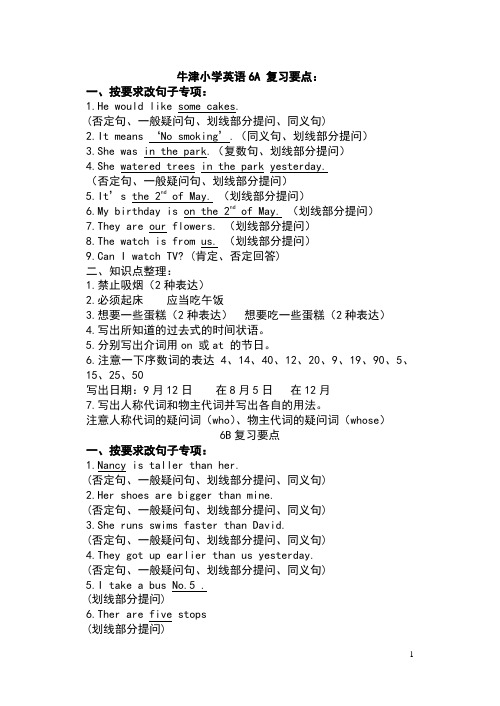
牛津小学英语6A 复习要点:一、按要求改句子专项:1.He would like some cakes.(否定句、一般疑问句、划线部分提问、同义句)2.It means ‘No smoking’.(同义句、划线部分提问)3.She was in the park.(复数句、划线部分提问)4.She watered trees in the park yesterday.(否定句、一般疑问句、划线部分提问)5.It’s the 2nd of May. (划线部分提问)6.My birthday is on the 2nd of May. (划线部分提问)7.They are our flowers. (划线部分提问)8.The watch is from us. (划线部分提问)9.Can I watch TV? (肯定、否定回答)二、知识点整理:1.禁止吸烟(2种表达)2.必须起床应当吃午饭3.想要一些蛋糕(2种表达)想要吃一些蛋糕(2种表达)4.写出所知道的过去式的时间状语。
5.分别写出介词用on 或at 的节日。
6.注意一下序数词的表达 4、14、40、12、20、9、19、90、5、15、25、50写出日期:9月12日在8月5日在12月7.写出人称代词和物主代词并写出各自的用法。
注意人称代词的疑问词(who)、物主代词的疑问词(whose)6B复习要点一、按要求改句子专项:1.Nancy is taller than her.(否定句、一般疑问句、划线部分提问、同义句)2.Her shoes are bigger than mine.(否定句、一般疑问句、划线部分提问、同义句)3.She runs swims faster than David.(否定句、一般疑问句、划线部分提问、同义句)4.They got up earlier than us yesterday.(否定句、一般疑问句、划线部分提问、同义句)5.I take a bus No.5 .(划线部分提问)6.Ther are five stops(划线部分提问)7.The bus stop is over there.(划线部分提问)8.I like summer best.(否定句、一般疑问句、划线部分提问、同义句)9.I’m going to play football tomorrow.(否定句、一般疑问句、划线部分提问)10.I’m going to the park.(划线部分提问)11.It’s sunny. (划线部分提问)二、知识点整理:1.形容词和副词的比较级的组成2.as+形容词和副词原形+as 和…一样3.in the streeton the road\on the right(left)at the stop\at the crossing4.get on\get off5.和南京一样热比南京更热6.周末计划顺便问一下在音乐会上7.Can I have some …?三、复习要点:(括号内主要适合的题型)1.四会单词(单词默写、英汉互译)四会句型(根据汉语意思写句子)2.三会单词(英汉互译)三会句型(选择题)3.课文读背(听力、选择题、作文)4.每单元主要知识点的掌握5.听力题、语音题、作文易失分。
牛津小学英语6A自备复习资料全

单词:cousin堂(表)兄弟姐妹question问题public公共的 sign标志mean意思是bin箱子danger危险must必须 away(离)开grass草off脱离,(离)开cage笼子quiet安静noise噪声know知道conversation对话complete完全的smoke吸烟litter乱丢cycle骑自行车back回suddenly突然地note钞票,纸币match比赛around在周围,四面nearby附近的keeper看守人 point指出fine罚款rubbish废物,词组:1.禁止停车No parking2.禁止吸烟No smoking3.禁止吃喝No eating or drinking4.禁止践踏keep off the grass5.禁止乱丢杂物No littering6.禁止触摸Do not touch7.安静Keep /Be quiet 8.朝他走去come up to him 9.罚款5元FINE ¥510.在鸟笼上on the birds’cage 11.指向point to 12.只有四岁only four years old13.有许多问题have a lot of questions14.问问题ask question 15.公共标志public signs 16.禁止骑车No cycling 17.在危险中in dange r 18.制造噪音make noise19.散步take a walk 20.远离stay away from 21.一个公园看守员a park keeper 22.环顾look around 23.在草地上走walk on the grass 24.进去go in25.建筑物上的标志the sign on the building句型:1. 这个标牌是什么意思?What does this sign mean?它意指“危险”。
牛津6A知识点
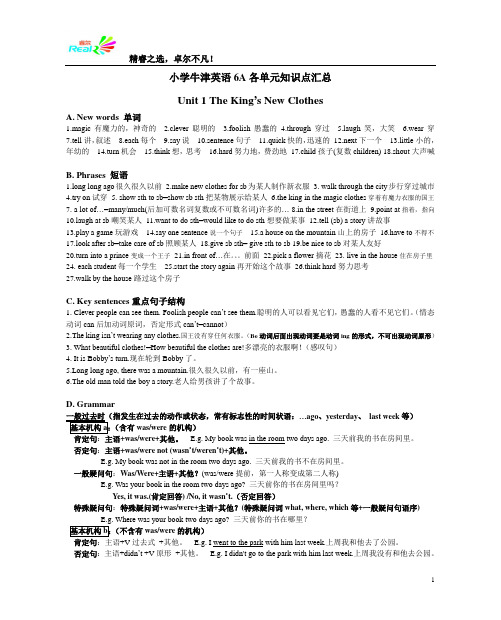
小学牛津英语6A各单元知识点汇总Unit 1 The King’s New ClothesA. New words 单词1.magic有魔力的,神奇的2.clever聪明的3.foolish愚蠢的4.through穿过ugh笑,大笑6.wear穿7.tell讲,叙述8.each每个9.say说10.sentence句子11.quick快的,迅速的12.next下一个13.little小的,年幼的14.turn机会15.think想,思考16.hard努力地,费劲地17.child孩子(复数children) 18.shout大声喊B. Phrases 短语1.long long ago很久很久以前2.make new clothes for sb为某人制作新衣服3. walk through the city步行穿过城市4.try on试穿5. show sth to sb=show sb sth把某物展示给某人6.the king in the magic clothes穿着有魔力衣服的国王7. a lot of…=many/much(后加可数名词复数或不可数名词)许多的…8.in the street在街道上9.point at指着,指向ugh at sb嘲笑某人11.want to do sth=would like to do sth想要做某事12.tell (sb) a story讲故事13.play a game玩游戏14.say one sentence说一个句子15.a house on the mountain山上的房子16.have to不得不17.look after sb=take care of sb照顾某人18.give sb sth= give sth to sb 19.be nice to sb对某人友好20.turn into a prince变成一个王子21.in front of…在。
牛津小学英语6A各单元 知识梳理
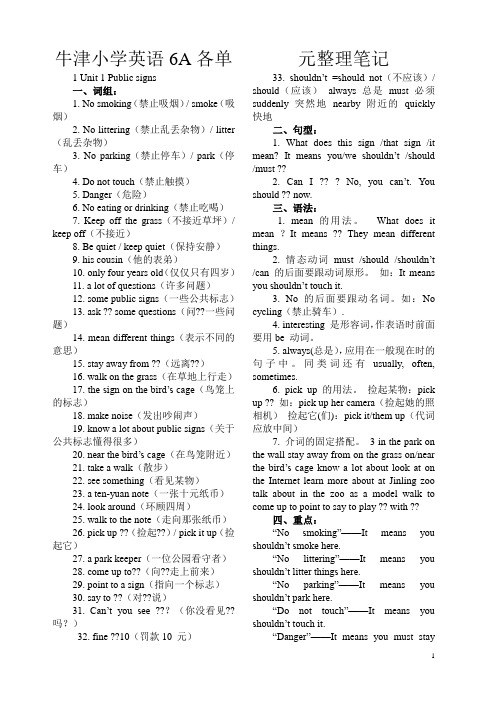
牛津小学英语6A各单元整理笔记1 Unit 1 Public signs一、词组:1. No smoking(禁止吸烟)/ smoke(吸烟)2. No littering(禁止乱丢杂物)/ litter (乱丢杂物)3. No parking(禁止停车)/ park(停车)4. Do not touch(禁止触摸)5. Danger(危险)6. No eating or drinking(禁止吃喝)7. Keep off the grass(不接近草坪)/ keep off(不接近)8. Be quiet / keep quiet(保持安静)9. his cousin(他的表弟)10. only four years old(仅仅只有四岁)11. a lot of questions(许多问题)12. some public signs(一些公共标志)13. ask ?? some questions(问??一些问题)14. mean different things(表示不同的意思)15. stay away from ??(远离??)16. walk on the grass(在草地上行走)17. the sign on the bird’s cage(鸟笼上的标志)18. make noise(发出吵闹声)19. know a lot about public signs(关于公共标志懂得很多)20. near the bird’s cage(在鸟笼附近)21. take a walk(散步)22. see something(看见某物)23. a ten-yuan note(一张十元纸币)24. look around(环顾四周)25. walk to the note(走向那张纸币)26. pick up ??(捡起??)/ pick it up(捡起它)27. a park keeper(一位公园看守者)28. come up to??(向??走上前来)29. point to a sign(指向一个标志)30. say to ??(对??说)31. Can’t you see ???(你没看见??吗?)32. fine ??10(罚款10 元)33. shouldn’t =should not(不应该)/ should(应该)always 总是must 必须suddenly 突然地nearby 附近的quickly 快地二、句型:1. What does this sign /that sign /it mean? It means you/we shouldn’t /should /must ??2. Can I ?? ? No, you can’t. You should ?? now.三、语法:1. mean 的用法。
牛津小学英语6A复习提纲(语法句型提纲)

牛津小学英语6A复习提纲(语法句型提纲)牛津小学英语6A复习提纲(短语、语法和句型)学号班级姓名一、词组1.No smoking 禁止吸烟2.No parking 禁止停车3.No littering 禁止乱扔4.No swimming禁止游泳5.Keep quiet保持安静6.Keep off the grass请勿踩草7.No eating and drinking禁止吃喝8.Do not touch禁止触摸9.stay away from避开10.five years old五岁11.make noise制造噪音12.my cousin我的表兄妹13.talk about谈论14.look around环顾四周15.Fine ten yuan罚款10元16.pick up拾起17.take a walk散步18.the fifth of March 三月五日19.take off 脱下20.blow out 吹灭21. a birthday party一个生日会22. a VCD of Chinese cartoons 一盘中国卡通片的VCD23.as a birthday present作为一份生日礼物24. a piece of paper一张纸25.fold it in half对折26. a running race一场跑步比赛27.just now 刚才28. a moment ago片刻前29. a roll of film一卷胶卷30. a pair of glasses一副眼镜31.in July在七月32.Sports Day体育活动日33.watch the moon赏月34. a pair of earphones一副耳机/doc/df2286318.html,st week上星期36.plant trees种树37.pull up carrots拔胡萝卜38.pick up oranges摘橘子39.on the farm在农场40.an exciting film 一部令人激动的影片41.in the mountains在山里42.National Day 国庆日43.have a chat聊天44.have a good time 过得愉快45.at the weekends 在周末46.after dinner晚饭后47.Children’s Day儿童节48.New Year’s Day新年49.their relatives 他们的亲戚50.something to drink一些喝的东西51.dress up装扮52.favourite food最爱的食物53.dragon boat race龙舟赛/doc/df2286318.html,st year去年55.Mid-Autumn Festival中秋节56.Dragon Boat Festival端午节57.Spring Festival春节58.eat rice dumplings吃粽子59.make pumpkin lanterns 做南瓜灯60.police station 警察局61.this morning 今天早晨62.get off 下车63.point to 指向……64.at the back of 在后部65.the present from his friend 朋友送的礼物66.at Christmas在圣诞节67.Christmas Day 圣诞日68.in front of 在……前面二、语法知识1、序数词序数词的构成是在以之相对应的基数词词尾加th,个别例外:◆one –first two—second three—third five—fifth eight—eighth nine—ninth twelve –twelfth ◆以ty结尾的,先变y为i,加thforty—fortieth twenty—twentieth◆缩写形式1st 2nd3rd4th 5th 22nd31st2、规则动词的过去时词尾变化◆一般情况下加ed 如play—played◆以不发音的e结尾的加d 如live—lived◆以辅音字母+y结尾的变y为i,加ed。
牛津小学英语6A主要语法知识及单词词组句式

牛津小学英语6A主要语法知识一般过去时:定义:表示过去某个时间发生的动作或存在的状态,常与表示过去的时间状语连用。
如:yesterday,last night ,three months ago,just now,a moment ago,that night 等。
它的肯定形式:I was born in 1995. I watched cartoons last night.它的否定形式:Were you born in 1995? Yes , I was./No, I wasn’t一般疑问形式及肯(否)定回答:Did you watched cartoons last night? Yes, I did./ No ,I didn’t.特殊疑问形式:When were you born? What did you do last night?动词的过去式形式:a:规则动词的过去式词尾变化:1. 一般情况下加ed,如watered,planted2. 以不发音字母e结尾的加d,如:tasted。
liked,lived3. 以辅音字母+y结尾的变y为i,再加ed,study——studied4. 单音节,以一个元音字母和一个结尾的,双写这个辅音,再加ed,如:stop-stoppedb:规则动词的词尾读音:a) 在浊辅音和元音后读/d/,如:pulled ,wateredb) 在清辅音后读/t/,如cooked , milked ,asked , picked, walkedc) 在/t/和/d/音后读/id/,如:collected , tasted , pointed , studiedc:不规则动词的变化没有什么规律,需要大家背熟记牢:is/am–was are-were do-did have/has-had go-went make-made sit-sat get-got see-saw come-came swim-swam put-put eat-ate drink-drank fly-flew buy-bought run-ran drive-drove know-knew meet-met catch-caught ride-rode sing-sang speak-spoke say-said teach-taught take-took think-thought write-wrote give-gave begin-began tell-told hear-heard keep-kept draw-drew 代词分为两种:人称代词和物主代词。
- 1、下载文档前请自行甄别文档内容的完整性,平台不提供额外的编辑、内容补充、找答案等附加服务。
- 2、"仅部分预览"的文档,不可在线预览部分如存在完整性等问题,可反馈申请退款(可完整预览的文档不适用该条件!)。
- 3、如文档侵犯您的权益,请联系客服反馈,我们会尽快为您处理(人工客服工作时间:9:00-18:30)。
6A知识梳理:Complete the sentences with the given words in their proper forms. (根据所给词的适当形式填空).1. What else do you do with _______(she)?2. I am ________ (heavy) than you.3. This is ________classmate. (Tom)4. He never goes ______ (cycle) with his mother.5. My father usually _______ (play) football with me.6. My classmates like _______ (play) basketball.7. I often play with ________ (they).8. Tom can work out the problem with ________ (he) father.9. Mrs. Smith sometimes _________ (go) to the cinema with her friends.10. Kitty __________ (not come) from England.Choose the right answer.(填入最恰当的答案)1. My sister usually plays __________ football with me.(a, an, the, /)2. ________ they go to school together? (Do, Are, Is, Am)3. Please bring one of _________ (we, us, our, ours) photos to class tomorrow.4. Who teaches ________Chinese? (we, us , our, ours)5. Alice has a dog. ________(It, It’s, Its, They)name is Sam.1 Peter___________ _______( always, be) friendly.2 They __________ __________(usually, be) helpful.3 They ____________ ________ (never be) late for school.4 They ________ ___________ (always, work) hard.5 I ___________ _______ (always, be) hardworking.6 She___________ _____________(never, get) angry.1. Beijing is our capital. Have you _________?A. been to thereB. been thereC. go to thereD. go there2. Have you been to Ocean Park_________?A. alreadyB. yetC. justD. never时态填空。
1. Can you ___________ (make) a model for me?2. Jim is watching TV, and his sister ___________ (do) her homework.3. I ___________ (be) eleven years old, and my sister___________ (be) twelve years old.语言点:1. at weekends= at the weekend在周末2. near/ far away from离….近/远near后直接接地点名词3. Where have you been in….?你去了….哪个地方?I have been to….in /on…我去了….例如:Where have you been in Shanghai? 你到过上海哪里?I have been to Century Park in Shanghai.我到过上海的世纪公园。
6.a photo of my brother and me 一张我哥和我的照片。
a photo of后接人称代词时,应该用宾格形式a photo ofme/him/her/it/us /them7. Which place shall we visit? 我们将参加哪个地方?8. When are we going to come back? 我们将什么时候回来?Come back回来Be going to 表将来be going to=will9. How are we going to get there? 我们将怎样到达哪里?How对交通工具进行提问。
回答可以用by bus/ car…/ on foot10. How much does it cost? 它花费多少钱?How much对价钱提问11. How about = what about怎么样?1. spend当“花费”讲的时候是指“花费”时间,财力,精力等在某事或某物上,主语是人sb. spend time/money on sth. / (in) doing sth.例如:She spends a lot of money on clothes.2. cost主要指花费金钱,时间,劳力,精力等,不用人作主语,主语是物,可带双宾语。
sth. cost sb.+some money+(to do sth.)It costs sb. some money on sth/to do sth.例如:The book cost me ten yuan. 这本书花费了我十元。
It will cost you 500 yuan to fly to Beijing. 坐飞机去北京需要花费你五百元。
3. take当“花费”讲时,多指需要“花费”时间。
主语可以是名词或动名词,常用it做形式主语。
It takes (sb.) some time to do sth.,干某事花费(某人)…的时间。
It takes me half an hour to go to school.练习:1. They spend too much time the report.(报道).A. writingB. to writeC. on writingD. write2. --What beautiful shoes you’re wearing! They must be expensive.--No,they only_________l0 yuan.A.spent B.took C.paid D.cost语言点:1. would like to do sth.想要做某事2. Would you like to be a/an…? 你想要成为一个….Yes, I would./No, I wouldn’t.是的,我想。
/不,我不想。
3. Why / Why not? 为什么?/为什么不?I would like to be a/an….because…我想成为…因为…4. Would you like rice or noodles for dinner tonight?or在这里是标示一种选择关系。
5. What kind of soup/fruit would you like? 你想要哪种汤/水果?6.I would also like some soup.=I would like some soup, too.also,too两个都可以表示“也”,also用在句中,但是too用在句尾,并且要用逗号隔开。
7.need to do sth.需要做某事。
We need to buy some food first.我们需要先买一些食物。
8.shopping list 购物单。
10. Let’s have tomato. Let后面接动词原形。
11.in the market / in the supermarket在市场/在超市at the fish/fruit/meat …stall在鱼/水果/肉….摊位in the fish/fruit/meat…section在鱼/水果/肉……部门14. A: Have you bought any garlic? 你买了一些大蒜吗?B: Yes, I have bought some garlic./ Yes, I have.是的,我买了些大蒜。
现在完成时,bought是buy的过去分词.现在完成时的构成是:have/has +动词的过去分词。
知识点1.1arrive at / arrive in / reach / get to 到达arrive at后接小地方arrive in 后接大地方He will arrive in Shanghai at two o’clock.reach是个及物动词,后面直接接地点名词I reach school at 7:15.2. will / be going to表将来,应该接动词的原形。
will是个情态动词,没有人称的变化.He will arrive in Shanghai at two o’clock. I will meet them at the entrance.be going to有人称的变化.He is going to go fishing tomorrow.They are going to go fishing tomorrow.3.look at 看;see 看见;listen to 听;hear 听见4.at the entrance 在入口处in the hall/in the Music room /in classroom6A/in the Arts and Crafts room5.具体的某一天介词只能用onOn Sunday, On Sunday morning, On the Open Day6.在具体的某一楼层只能用介词on,并且第几层还要用序数词On the ground floor, on the first floor, on the fifteenth floor7. want sb. to do sth. = would like to do sth.想要做某事I want you to read English every day.我想要你们每天都读英语。
